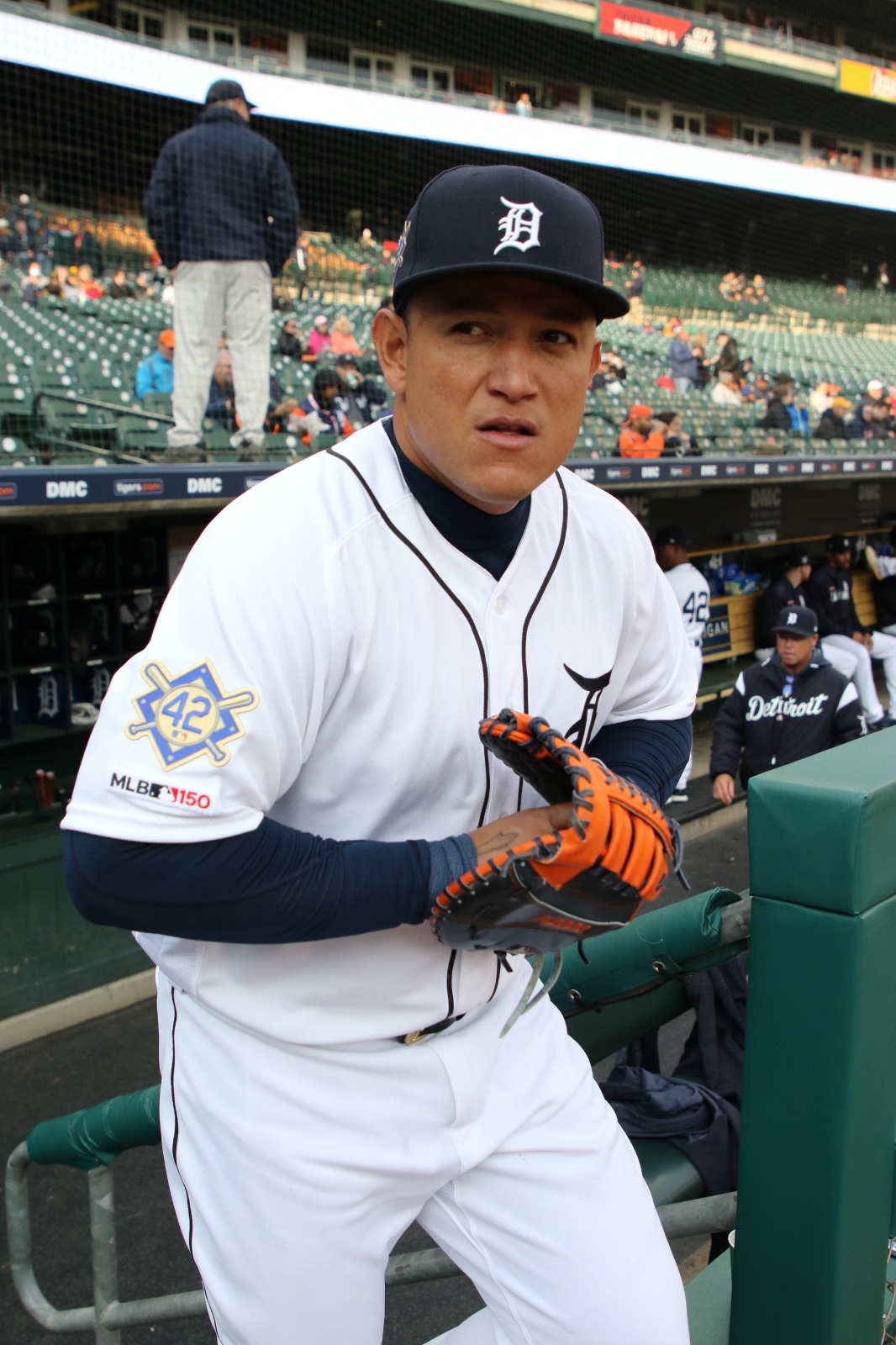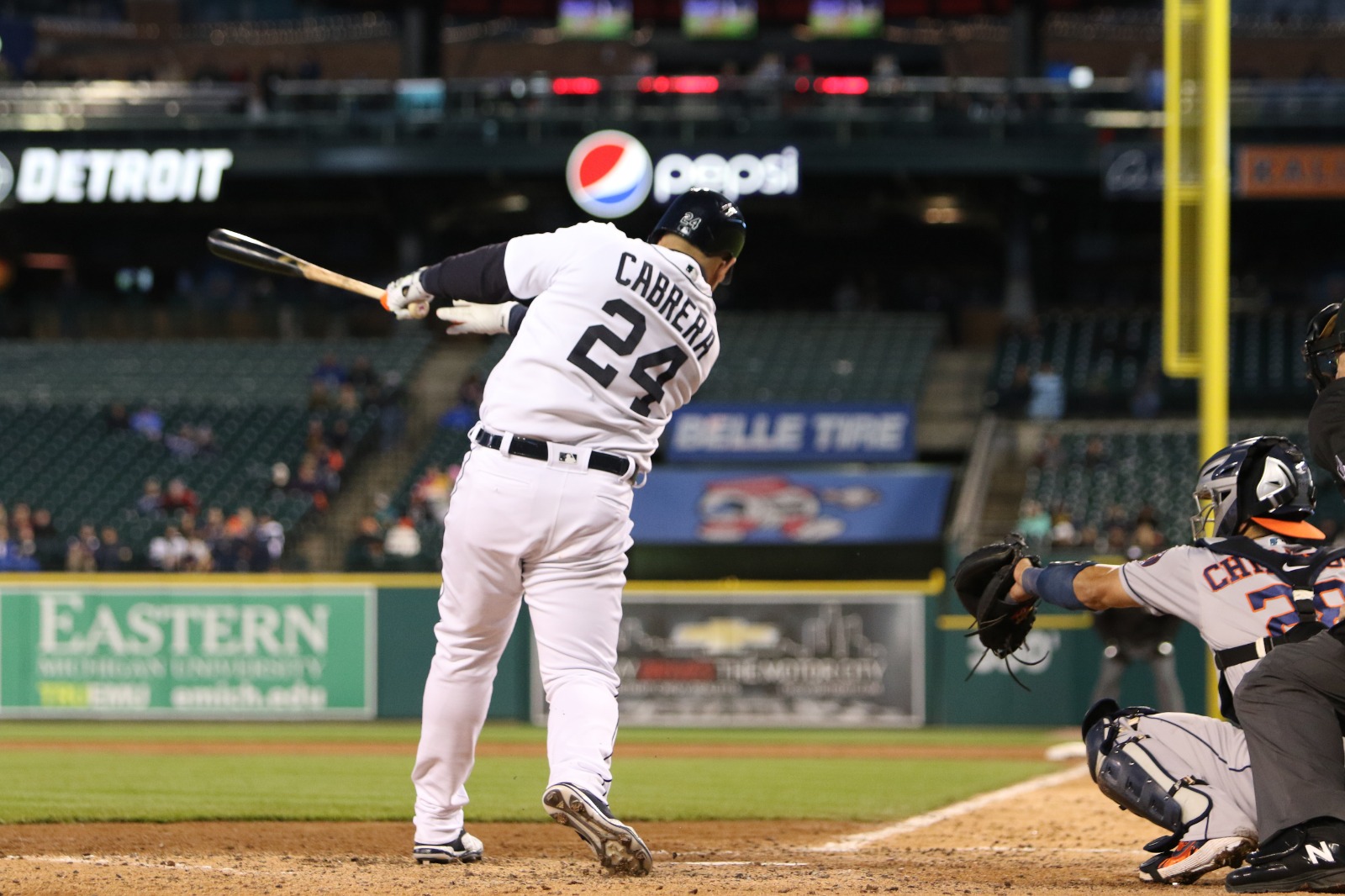Photo by Gregory Shamus | Getty Images North America | AFP
The same week when Miguel Cabrera slapped his career’s 2.800th hit, Wilson Ramos set a record for Venezuelan players by hitting safely for 26 games in a row, Eduardo Rodríguez won his 17th game of the season, Gleyber Torres tied Joe DiMaggio with the most home runs for a Yankee player at 22 years old, Eugenio Suárez hit another homer surpassing the 40 home runs in the season, Ronald Acuña came out from a slump with his 37th homer, Miguel Rojas came back to play by hitting a home run against Felipe Vásquez, who was the Reliever of the Month in the National League; José Altuve also pounded a homer, Eduardo Escobar also shined and hit a homer, Wilson Contreras smacked a home run while returning to play regularly, Abraham Toro helped Justin Verlander to complete his third no-hitter with a two-run homer, Luis Arráez kept his intense rhythm at-bat and Cookie Carrasco came back to play from a serious disease.
—With this summary, we start our talk, by asking him how does he feel about 2019.
—It’s important to highlight that the Venezuelan players’ level is increasing. The good job done during the last years is being noticed. We hope we can keep going that way, that not only two or three players can be at the news, but that we can be at the news with more players and that Venezuela’s baseball keeps growing up.
—The younger players from nowadays always say that they grew up having you as their idol. You say that you grew up with Vizquel as your reference and Vizquel grew up admiring David Concepción.
—Vizquel is one of my idols, like Andrés Galarraga, Oswaldo Guillén. It’s a chain, everyone wants to emulate their idol. Kids can’t imitate the players they didn’t see playing, they reflect themselves on those who are playing right now, those who are excelling the most, such as Ronald Acuña, Gleyber Torres. That’s how it is, those who know history are aware that it has always happened and we hope that chain keeps going: having more successful Venezuelan big leaguers.
—At the middle of the season, after several days in the disabled list and very strict physical examinations, you stopped being the starting first baseman for the Detroit Tigers to go on to play under the role of the designated hitter. At first, you didn’t like that decision, because you love to play in the field. Do you think you can come back to play at first base?
—About being DH, it was to avoid missing the whole season because the physician told me that was the only thing I could do. When I recover from my knee the next year, I think I’ll be at the field again.
—Social networks are a place where everyone can give their opinion. Sometimes without having enough information, some comments say Miguel Cabrera has overweight, others say that he has trouble running. The truth is that this is nothing new, those are recurrent criticisms. Have you read those comments?
—The one who says things like that is like the one who sees what he wants to see. The one who pays attention to that kind of post shows that they care about things that aren’t worth the time because, as you said, in the social networks there are people who don’t have any idea of what they are saying and paying attention to that is a waste of time. I know my reality, the team knows my reality, the ones around me know about what I am going through. The overweight issue has been there during my whole career, they have criticized me for that, [they say] that I’ve had so much weight, that I am out of shape. It’s the same story of every year. The same debate every year, that I can’t run and other stuff. The truth is that they don’t have any information, the one the team and I have. We aren’t here to clarify doubts to all the people who have an opinion, we are here to do the job. I must come here, work, do what I like, play baseball, try to win the games and keep developing myself as a ballplayer.
—Do you have any routine?
—I don’t like routines because they are boring. That’s not the way I live my life. I do what’s necessary and important to be ready for the workouts and the game. It’s what I’ve done through all my career.

Photo courtesy of Detroit Tigers
—Do you feel in debt with Detroit because the team hasn’t won the World Series?
—We owe a World Series to Detroit that we haven’t been able to get, but that doesn’t mean that we are going to give up. The current team has a lot of young players and that doesn’t mean that in the future we won’t be able to win the Series. We are always optimistic. People can say what they want, it’s their way of thinking, but that doesn’t mean it’s true, it’s just that everyone has an opinion, what we can’t allow is that those kind of comments affect us, no matter if they are positive or negative. I know what I can do on the field and what I can’t, that’s what matters at the end of the day, what one thinks and feels.
—What’s what you can’t do right now?
—Plat first base, for now.
Playing at first base according to Andrés Galarraga
For this talk, I consulted Andrés Galarraga, about Cabrera’s situation. To defend first base you need some abilities and attributes that not anybody has, it’s a demanding position that requires from the player to be in his best condition. Galarraga says: “To play at first base isn’t as easy as people think. It demands a lot of work: each grounder, each popup, to stretch, to take the throws on the dirt. It’s very difficult to play at first base with an injury in the knee because you have to move fast with every grounder and the infielders’ bad throws.”
—Since you started showing your power and consistency as a hitter, Venezuelan fans began to dream with the first native player hitting 500 or more homers. You are very close. Some people say you haven’t accomplished that goal because you play in Detroit. What would you tell those who say you would have more than 500 homers if you wouldn’t play at Comerica Park?
—That they are right. I would have more than 600.
—To be so close to the 500 home runs and the 3000 hits make you think about it?
—What I have always thought is that one put numbers only if one is on the field, and accumulating numbers requires years in play. One doesn’t step at home plate to think about that, because that way one loses focus. One has to concentrate on trying to help the team win because thinking about personal numbers when you are playing means losing the focus needed to give the best performance.

Photo courtesy of Detroit Tigers
—The week before it went viral in the social networks the video of the at-bat where you faced your ex-teammate, Justin Verlander. It was evident the exchange of admiration, respect, and affection between you two. That’s not usual nor common when both of you are future Hall of Famers. How do you remember that moment that everybody could see?
—It was very special for me because those who know Verlander know very well that when he is on the mound, he doesn’t have any friends. When he’s going to pitch, he goes into the clubhouse with his earphones on and doesn’t talk to anybody. He’s 100 percent focused and, as he always says, he wears his “Game Face” expression and warns: “If you want to talk to me, do it after the game or the other four days before pitching”. I’ve always respected him for those things. He made a very kind gesture to me when I was batting and I am very thankful. The gesture I did to him was what I had at the moment and in fact, that was a beautiful moment in my career because we were teammates for many years, a lot of good experiences here in Detroit that we are always going to remember. Besides having been good teammates, we are good friends.
—Are you playing with pain?
—That’s not a secret for anybody. If they read the report about my knee, everybody knows that I am playing in pain. They should have operated me because I have a painful injury.
—What do you do to put up with it?
—Nothing. I think that pains are mental. It hurts, but if one can control the mind. one can be quiet.
—Do you do any special work to endure the pain?
—Self control. It’s something I’ve practiced during my whole career because I have many years playing injured.
—A lot of time playing like Mickey Mantle…
—You can’t waste the opportunities, this career is very short.
—And yours goes for 16 seasons. Not a few.
—If it was up to us, we would play for 50 years.
—What do you think about that nowadays, when a ballplayer goes beyond 32 years old, he’s seen as an old man?
—That’s the new baseball. Major League wants it that way and you have to respect those decisions.
—But Omar Vizquel played until being 45 years old.
—They played at a good age. Ballplayers from the past played until 40-45 years old and nobody said anything. Nowadays it’s like a sin to play baseball after being 35 years old.
—Now when you are just 77 hits behind Vizquel, how do you see the fact that you had got so many hits?
—When he did it I think there were less than 50 players who had achieved that milestone. How many ballplayers have passed through the major leagues in the last 50 years? Almost twenty thousand. To accomplish that has a lot of merits, plus the Gold Glove awards, plus the whole clean trajectory he had and everything he did for the game. Omar Vizquel has to be in Cooperstown’s Hall of Fame.

Photo courtesy of Detroit Tigers
—What do you think about sabermetrics?
—It’s a matter of numbers. Last year and the one before it they moved the infield to the right side against me. As I hit to the opposite side, they went back to playing normal positions. This year they are fielding as they fielded against me before, all depends on how you are performing in the season. That doesn’t affect the batter, because one beats that defensive shift. One says: “Ok, keep fielding like that, anyway one is going to keep getting hits.” I’m not affected by my game. They took double plays from the pitchers, yes. This is a different baseball compared to the one played before, but to say it affects the batter, I don’t think so. I think it’s an advantage for the batter.
—You knew how to adapt to it, they set the defense on one side, you hit to the other one.
—That’s it. It’s what the batsman has to do to adjust to the situation.
—Jim Leyland has always said that one of your virtues is the speed to make the adjustments when the pitcher releases the ball.
—Baseball is a game of adjustments.
—For the Venezuelan ego it’s important that you get those round numbers: 3 thousand hits and 500 home runs. That’s what I see in social networks.
—That’s the big problem of us: the Venezuelan ego. We have to leave that ego behind and respect the others. When we learn to do that, I think the troubles are going to start to get solved in Venezuela. They can talk well or bad about me, that doesn’t mean that I am what they say. What people say, tells a lot about themselves. I don’t pay attention to them, I don’t do it because negative things are what sell. Then what you has to do is to be in peace on yourself and try to do everything well.
—What do you think about the Venezuelan situation?
—That political problem has to be solved in one way or the other because the most affected are the citizens. Especially the ones from poor neighborhoods, those who have less. The political problem must be given a solution because it’s affecting the country too much.
***
Miguel Cabrera owns a foundation that supports hundreds of kids in Venezuela. For several years he has invested resources and time to support causes that benefit people who need it. He has raised his voice to oppose repression for demanding freedom and rights.
The first time I interviewed Miguel he was almost a kid. He had recently won the 2003 World Series, with the Marlins. Our talk happened at Oswaldo Guillén’s home, in a December morning when they were about to cook hallacas (a Venezuelan typical dish) led by Ibis, Ozzie’s wife. In that opportunity, we talked about what he wanted to do with his future. He dreamed of playing for many years, with following his idols’ steps, hitting homers and also becoming an example.
Afterward, we have had several conversations. We’ve talked about his best moments and also about the falls, the mistakes and the work executed to solve them. For this interview, the Venezuelan journalist Carlos Guillén, who works for the Detroit Tigers’ press room, set the appointment for us between the batting practice and the clubhouse, just before the play ball shout at Kansas City’s Kauffman Stadium.
I remember that Oswaldo Guillén told me, while we looked at the Avila mountain from his garden. ‘He’s going to be the best hitter born in this country, he’s going to amaze us, he’s going to get lost out of sight.’ He didn’t say it as a magic prediction.” Miguelito arrived in the major leagues with a forecast he has confirmed completely for 16 years.
Now he’s a veteran player who only nhas to retire to see his plaque in the gallery of immortals in Cooperstown. But now is when the guy from Maracay will keep on adding numbers and joy.
Miguel Cabrera’s Accolades
—11 All-Star Games
—7 silver slugger awards.
—4 batting titles.
—2 times home run leader
—2 Most Valuable Player Awards
—The batting triple crown in 2012. The first one since 1967
***
Traducción de Alfonso L. Tusa.
Mari Montes
ARTÍCULOS MÁS RECIENTES DEL AUTOR
Suscríbete al boletín
No te pierdas la información más importante de PRODAVINCI en tu buzón de correo


